No! You Hang Up First
Season 9, #4: Daytalking booty calls, workplace rebellions, and midnight confessions
BEFORE EMAILS THERE WERE, it seemed, ever-present online chat rooms. Later came smartphones and texting.
Eventually no one talked to anyone any more. At all. I mean, there were grunts and whistles, hems and haws, but that was about it.
As we wrap up Season 9: Daytalking, it’s with a degree of sadness—it being summertime and all, but 2025 has been as everyone knows vastly different from summers past.
When you’re a kid the days stretch on forever. Then suddenly it’s late August and the first day of school is beckoning. Now, as an older adult, you’re working throughout the year with a slight dip during the summer months. But the whole experience is the blink of an eye.
Which got me thinking—maybe a tad reminiscing—about a past I’ve left behind and some things connected with it.
And much later, at my first real corporate job, when I was in my mid-twenties.
The Receptionist Is AWOL
THE LAST CORPORATE RECEPTIONIST I knew was named Barbara and she was—as receptionists go if they’re any good, very cheerful—almost on the overly chirpy and robotic level.
I thought about this while doing my normal 21st century remote work jam.
“Hey,” I thought. “What happened to all the receptionists?”
I mean, I bet it’s hard to land an office job like that these days. Usually with the receptionist came the mail room people—mostly guys it seemed—and all the busywork that happened in a large corporation. I left our brick-and-mortar office soon after COVID hit, and since learned they closed down both floors and went rental somewhere in North Minneapolis. I don’t need to go there as my work team is everywhere but Minneapolis. (I am the sole survivor.)
The same could not be said for Alma, who was the receptionist at another company at least 30 years before Barbara. Alma had a very pinched, nasal and sour loudspeaker delivery, unmistakably hers, like Ethel Merman on low volume or, as I used to imagine, Lily Tomlin’s Geraldine the Operator (minus the snorting laughter).
Alma probably died decades ago as she was much older in the mid-1980s. “Where have all the receptionists gone? Long time passing…”
Hum along with me.
“Pilaster Bilgewater to reception. Mr. Bilgewater to reception, please.”
That’s all, Alma. You can punch out now.
Queenie Was No Townie
“…it seems to me that once you begin a gesture it’s fatal not to go through with it.”
—Sammy from John Updike’s “A&P”
SUMMERTIME, I THINK, IS a sweet kind of sad (this is apt preparation for Season 10: Nightwalking, which can also be sad but also bittersweet and filled with song). Sometimes I’ll listen to summer-adjacent music, like the Beach Boys or Beatles or even the Rolling Stones. This year it’s been either light jazz or classical. I cannot write my own words with another person’s lyrics stomping through my head.
In the world of literature, John Updike’s 1960 short story “A&P” always reminds of summertime as a young boy. It’s flecked with details of things you’d no longer see in a 21st century grocery store: analog cash registers, checkout staff with aprons, bow ties, and crisp white shirts, “housewives” in pin curlers, and pyramids of “Diet Delight” canned peaches rising up from the “checkerboard green-and-cream rubber-tile floor.”
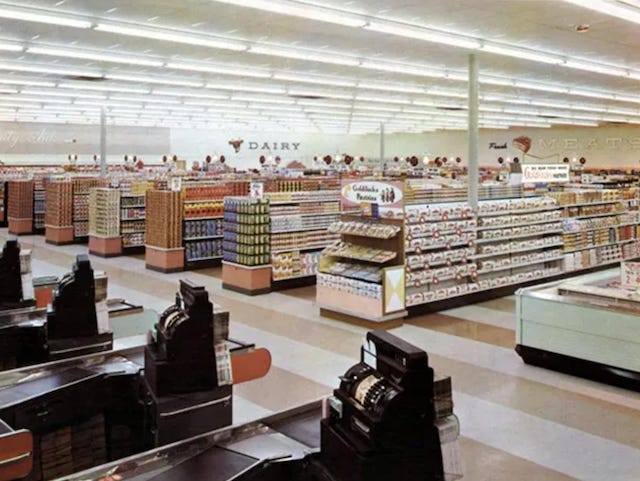
Our storyteller, Sammy, is all of eighteen. His boss, store manager Mr. Lengel, probably hired him because he knew Sammy’s parents. Sammy’s coworker, Stokesie, is older and married with two babies at home. If you’re not familiar with the story, it’s short and worth a read. There’s not much of a plot: Sammy and Stokesie are working checkout when three swimming suit-clad teenage girls come into the grocery in search of a jar of herring snacks. We are totally inside Sammy’s head—that’s what drives the story.
Moreover, rereading “A&P” reminds me of me.
I could’ve been Sammy, working at the corner grocery, but it would’ve been in the late 1970s if we match age for age. By then I was flipping burgers at the suburban mall with my friends Steve and Chad, afterward hanging out with my coworker and new girlfriend Stephanie. Sammy’s voice harks back to my own—seemingly observant but with my own set opinions that always needed asserting. His running commentary on late 20th century “sheeple” and their mindless shopping habits bleeds through the entire story. It’s nearly subversive.
It’s also a commentary on “townies” versus the summer tourists and colony beach owners who dominate the summer landscape—our three swimsuit-clad shoppers are the latter. As Sammy observes: “The sheep pushing their carts down the aisle—the girls were walking against the usual traffic (not that we have one-way signs or anything)—were pretty hilarious.”
Sammy’s eye has locked on one of the girls—the one he calls “the queen.” Her dirty pink bathing suit (maybe beige, the store lighting could be playing visual tricks), “with nubble all over it,” is revealing. After all, its straps had fallen down over her shoulders showing a prim face that Sammy muses about…
Walking into the A&P with your straps down, I suppose it’s the only kind of face you can have. She held her head so high her neck, coming up out of those white shoulders, looked kind of stretched, but I didn’t mind. The longer her neck was, the more of her there was.
If you walked over to the store’s meat section and asked the butcher to borrow his cleaver—and he gave it to you—you couldn’t whack this Updike story more neatly in half than Updike does: Sammy begins the first paragraph in conflict with a customer who’s busted him on a checkout error, and by the break we have a full view of Sammy’s inner world.
“Now here comes the sad part of the story,” he says. Like a Rube Goldberg device of mid-twentieth century making, “The whole store was like a pinball machine and I didn’t know which tunnel they’d come out of…”
…around the lightbulbs, records at discount of the Caribbean Six or Tony Martin Sings or some such gunk you wonder they waste the wax on, six-packs of candy bars, and plastic toys done up in cellophane that fall apart when a kid looks at them anyway.
What a world, huh? Sound familiar? But will Sammy make contact with Queenie?
You see, that’s the point of “A&P”—how the environment isn’t particularly conducive to real human interaction. It’s hostile from the get-go. It’s set up to protect some artificial world that, beyond of the face of it, doesn’t exist. Sammy knows that. Queenie might be living proof of it. He doesn’t know yet.
That’s when his boss Mr. Lengel shows up.
“Girls,” he chides, “this isn’t the beach.” As Sammy is checking them out (literally and figuratively) he finally hears Queenie’s voice (“My mother asked me to pick up a jar of herring snacks.”) and Sammy immediately falls into reverie [emphasis mine]:
Her voice kind of startled me, the way voices do when you see the people first, coming out so flat and dumb yet kind of tony, too, the way it ticked over ‘pick up’ and ‘snacks.’ All of a sudden I slid right down her voice into her living room. Her father and other men were standing around in ice-cream coats and bow ties and the women were in sandals picking up herring snacks on toothpicks off a big glass plate and they were all holding drinks the color of water with olives and sprigs of mint in them.
The fuse lit by Lengel has reached the charge. “Girls, I don’t want to argue with you. After this come in here with your shoulders covered. It’s our policy.”
After his boss turns away, Sammy thinks, “That’s policy for you. Policy is what the kingpins want. What the others want is juvenile delinquency.”
Let’s cut to the chase: Sammy quits his job at the A&P right then and there. Lengel is shocked. Sammy hopes Queenie notices his derring-do, but the three girls are gone. “Sammy,” Lengel says, “you don’t want to do this to your mom and dad.”
“It’s true,” Sammy thinks. “I don’t. But it seems to me that once you begin a gesture it’s fatal not to go through with it.” He leaves his apron, name tag, and bow tie behind and walks out, feeling somewhat sick as he realizes: “I felt how hard the world was going to be to me from here on in.”
Out of high school, my friend Steve and I landed a temporary job at a sheet metal factory just outside our home town. On a hot summer afternoon after our first day—dripping with sweat and disgusted by the dead rat we saw covered in grease in the shop corner—we punched out, never to return. We walked the dusty railroad tracks to the next town where I called my parents. Mom answered the phone.
“What will you do now?” she said worriedly.
“I don’t know.”
But I was sure I could find something better.
Somewhere still in an analog world.
Late Night Caller
“Back in high school I used to close the door to Daddy’s den and gab on the phone to friends like Liz or Kathy, and boyfriends like Steven Kellerman or Jeff Dunne. Stevie was on the track and field team, had a mop of curly blonde hair and a grin that used to kill me. I first felt so shy around him, but once we got talking on the phone it seemed so natural. It was a shock when I later found out he wanted to date a sophomore, Sally or Suzy, I can’t remember what her name was.
Jeffrey was different on the phone. He talked a lot about himself, but I didn’t mind because he had such an interesting way of looking at things. He loved that I played second-chair violin in the school orchestra and he had a lovely singing voice, since he was a tenor in the school choir. Those things we used to say over the phone in Daddy’s den—giggles and silly talk and then confessions: ‘I’m gonna miss ya until tomorrow!’ Sighs and snorts. ‘Me, too! Can’t wait to see you again!’
Then Daddy would crack open the door and peek in: ‘Peaches, get off the phone. Your mother needs to make a call.’”
—Nicole Ruskin from I Am Monster Road
IF I MISS MY past, it’s the emotion of it all. The present seems drained of emotion. Even getting angry doesn’t seem “angry enough” anymore.
Maybe in our new century anger has been dissipated by disgust and ennui, which to my mind becomes depression and, well, addictions and bad behavior. I don’t know. I’m just over here trying to keep my head above the fray.
The quote above is from my unfinished novel Monster Road, an earlier draft that I titled I Am Monster Road, but, again, I don’t know. I transferred my emotion from one end of an old telephone line to the other and changed sexes in the process. It was an interesting experiment. And I didn’t even have to cross-dress for it!
My high school girlfriend Kim and I talked on the phone over December 1976. Our tête-à-têtes were always in my late father’s den because I could close the door and get some privacy from the prying ears of my younger brother. And Kim and I could engage in a lot of cooing and whispering. Wishing and hoping. The human teenage equivalent of a cat purring—albeit over a telephone.
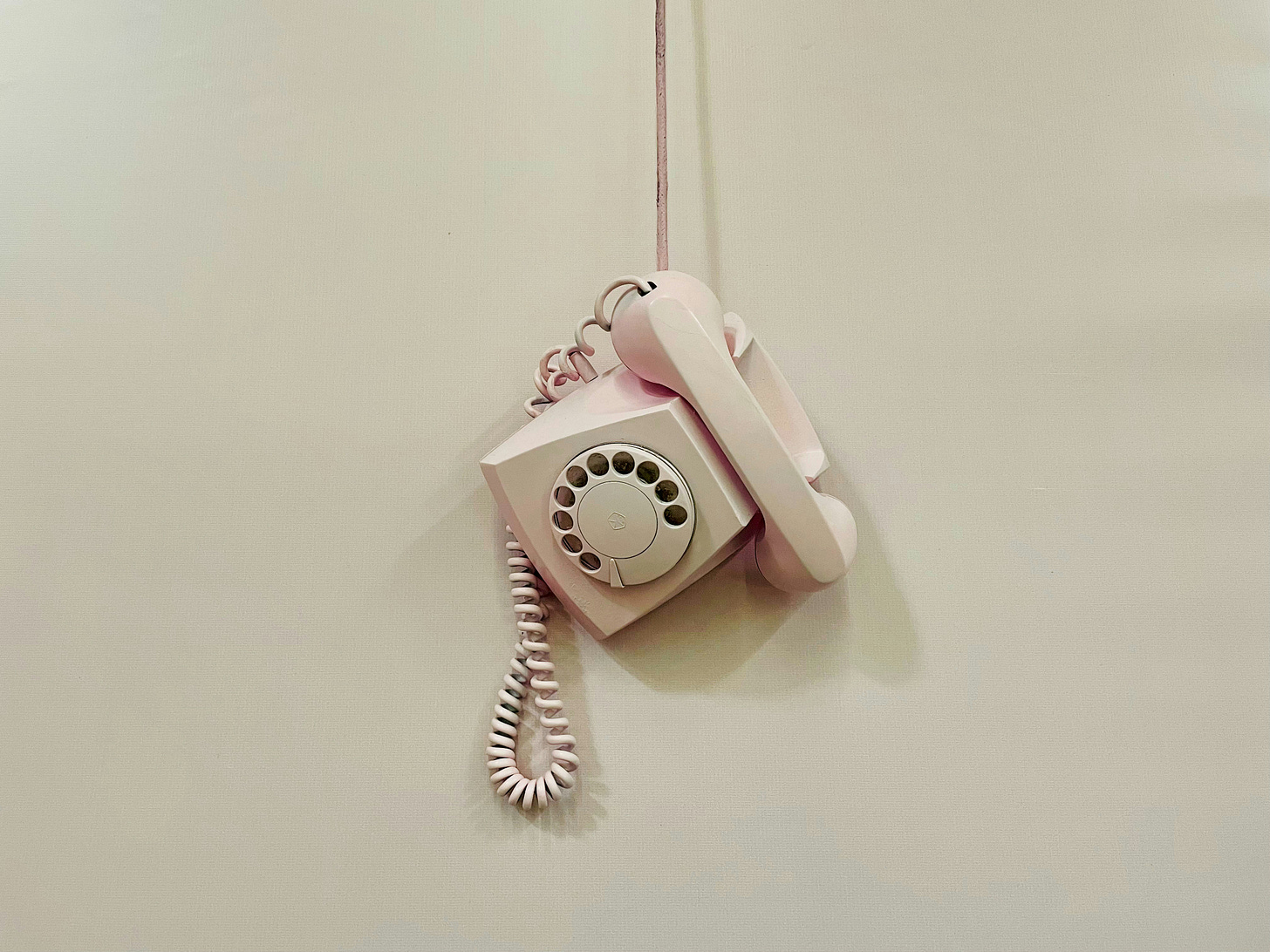
I recall overhearing my Dad outside the door saying to Mom, “He’s talking to that girl again.”
“Who?”
“You know, the one from church.” Shrugs and more TV Guide rustling and the changing of channels.
Goodnight, Kim. “See ya tomorrow, Bright Eyes.”
Wherever you might be now.
The Oracle Always Rings Once
IT’S MORE OF A spring, summer, fall thing. Reason being: Snow covers the ground in winter, duh.
And it dates back to my “unplanned sabbatical,” or “underemployment years” of 2012–2016. While that doesn’t seem like a long time, it felt like an eternity as I was selling a condo that was financially underwater and trying to extricate myself from a toxic workplace and relationship—all at the same time, just three years after both my parents died.
It was a horrible, horrible time.
So, while on the street, after I’d sold the last car I’d ever own, I’d look for coins. When I found a penny, I’d go: “The Oracle speaks!” and take it home to look at the date and see if there was a matching entry in all my diaries and journals to the date on the coin. Then into the “piggy bank” (actually a used pistachio bag) the coin would go. Savings the old school way.
So yesterday, August 20, 2025, I found this just outside the apartment back entrance:
While most pennies I find are 21st century issue, this was a stunner—1969! Immediately I knew I would not have a diary or matching journal entry for that year as I didn’t start writing in journals until January 1973. But I refused to lose hope and can share the best guess I have for what might have happened on Wednesday (just like yesterday), August 20, 1969.
I would’ve been nine years old. I Googled the date and surprise, surprise, the Beatles were in the EMI Abbey Road Studios recording their final album Abbey Road. Wow.
The previous year (hey it could’ve been the summer of 1970—memory is a hazy thing!) I was at Olney Elementary School in Maryland and that fall going to Farquhar Middle School—a huge leap and a scary future ahead, much like Sammy must’ve been feeling in Updike’s story when he quit his grocery job. You see, I was happy at the old elementary school. I was learning to write and create and had my friends Jay, Sam, and girlfriend Mandy by my side.
Middle School would tear us apart. And it did.
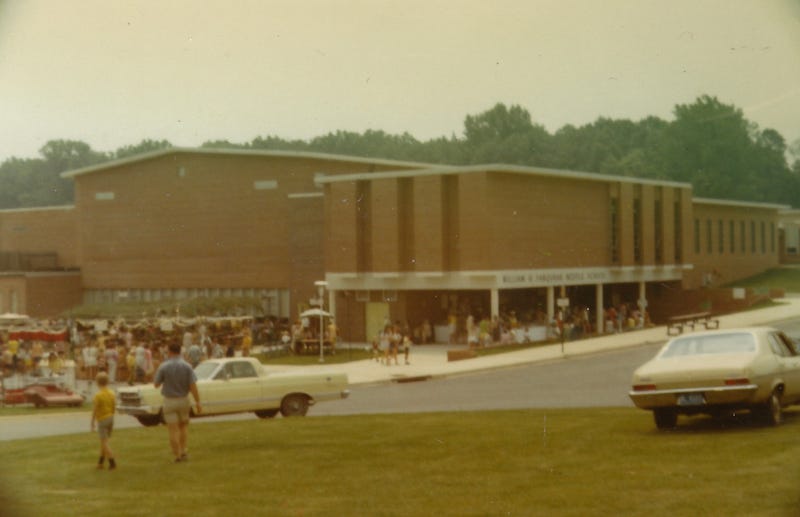
O, Oracle, why then? Why now?
Well, I think there’s an answer. To translate the Oracle’s likely pronouncement: “You are entering a period of transition.”
I can only imagine what that hot summer of 1969 or 1970 was like. Trips to the beach, to the dentist, the Bethesda swimming pool for lessons—and, as the above photo shows, walking with Dad to a school festival either just at the year’s start or in preparation for it. Who knows?
What I do remember is we left Maryland for Minnesota in December 1969/January 1970 (or December 1970/January 1971) when Dad was hired by the University of Minnesota to work on their Health Sciences construction project. It would span years and we would have to live in the Upper Midwest.
But between late August and early December—three lonely and agonizing months—I’d be shackled to Farquhar Middle School, staring bleakly out their tall plate-glass windows. I was teased and taunted in the school halls and bored in the classrooms.
It felt like prison.
If the Oracle is correct, then maybe I’m on the verge of being sprung from some later version of said prison.
Boy do I ever welcome that news!
And when it comes, I will heed the call.
StoryShed News for Free Subscribers
I’m taking an end-of-summer break and restarting newsletters in mid-to-late September, with Season 10: Nightwalking (mostly music-related, but who knows?). It’s great to have you as a StoryShed free subscriber and I value your subscription. Did you know you can buy me a coffee? I would like that very much:
I’ll be improving StoryShed’s Substack with more collaborations, interviews, video chats, and deep-dive seasonal episodes like, oh, maybe reading all of William Shakespeare’s plays in the order they were first written (“Willtality”) or the plan for Season 11: Stargazing, the launch of a Substack version of a death and dying course I hoped to teach a few years after my parents passed away (“How2Die”) where we explore Plato’s The Death of Socrates and whether the philosopher actually proved there is a life after death (I believe he did and am determined to convince you, too).
Thank you again for reading and subscribing to StoryShed!
Notes and extra texture
We can’t hang up without music to fit the mood, amirite?
“…but when I dial the telephone…nobody’s home.”
“…in the past few days I’ve grown to love your giggles on the phone…”



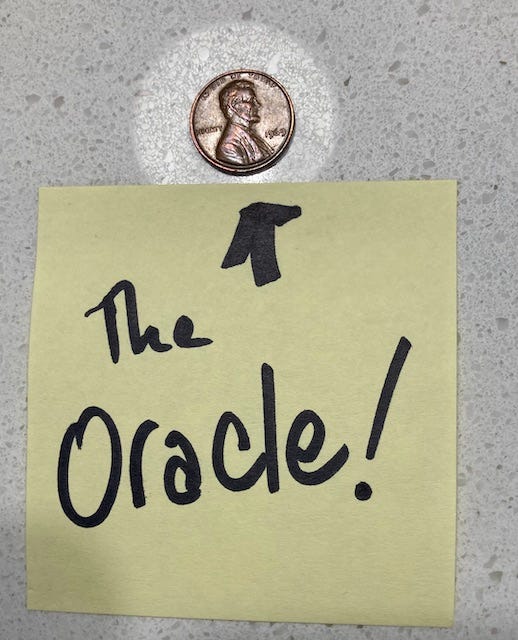
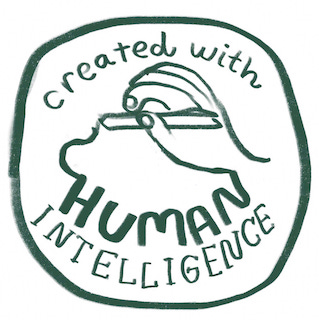

Michael, you must finish that Monster Road novel. I was really taken by it. But then I enjoy your very observant and true-to-life writing.
Middle school tore my friendship groups apart too. And my school in Endwell looked a lot like yours, with the same kind of cars in front of it!
What a blast from the past to hear Sugarloaf, and love Abandoned Luncheonette and early Hall and Oates. It really brings back that era.
…something pretty rediculously rad about the simplicity of the single telephone, single telephone line…a household of sic there were times any of us needed it all at once, but the fact that communication wasn’t anyone everyone all at once added some magic and purpose to even the most mundane of phone calls…some day we are only going to be able to afford simplicity in a subscription…